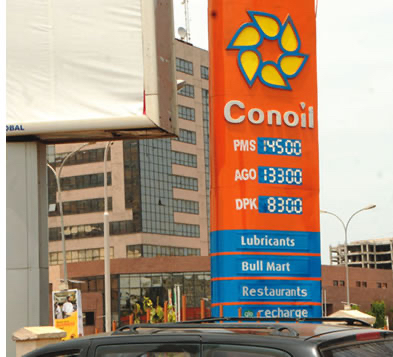KEY POINTS
- Net profit slumped to ₦900 million in H1 2025, down 89% from a year earlier.
- Soaring finance costs and weak white product sales hit revenue and margins.
- Shares have lost nearly 40% YTD amid investor worries over outlook.
As the downstream oil marketer reported its worst half-year performance since 2020, Conoil Plc is going through its most challenging period in six years. Falling revenues, eroded margins, and skyrocketing finance costs caused the company’s net profit to plummet 89% to ₦900 million in the first half of 2025.
Earnings per share fell to ₦1.30 from ₦11.56 during the same period last year, according to unaudited financials submitted to the Nigerian Exchange. Lower sales volumes in its core “white products” portfolio—petrol, diesel, and aviation fuel—which account for more than 96% of total sales—were the main cause of the revenue decline, which fell 20.4% year over year to ₦143.65 billion.
Conoil’s weaknesses were exposed, but the decline in topline growth reflected a larger sectoral slowdown. Its capacity to absorb cost pressures was undermined when gross profit dropped by more than a third to ₦11.36 billion, despite a 19% decrease in cost of sales.
Finance costs surge as interest wipes out 42% of gross profit
The biggest hit was caused by financing costs, which more than doubled to ₦4.76 billion annually. The firm’s heavily overdraft-dependent capital structure was punished by the high interest rate environment, even though total borrowings actually decreased to ₦21.5 billion from ₦28.7 billion at the end of 2024. Concerns regarding Conoil’s funding model in a tightening monetary environment were raised when interest payments alone wiped out nearly half of gross profit.
Operating costs provided little respite. Administrative costs stayed the same, but distribution costs increased 19% to ₦2.24 billion. Inventory reductions and better receivables collection were major factors in the company’s ability to report positive cash flow from operations, which increased from ₦8.8 billion in H1 2024 to ₦12.57 billion.
Despite this, its cash and cash equivalents were down ₦13.6 billion, a legacy of previous inventory overbuilds and prolonged credit sales meant to protect market share in the face of fierce competition.
Given Nigeria’s inflation-driven liquidity crunch, BusinessDay reports that trade receivables increased 24% to ₦89 billion from December 2024, casting doubt on Conoil’s working capital discipline.



